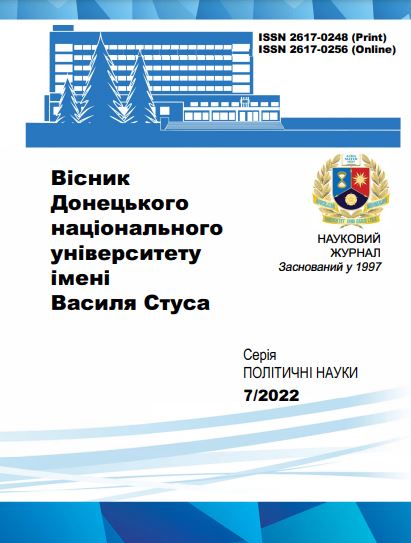Putinism as the main existential threat to Russia's European perspective
DOI:
https://doi.org/10.31558/2617-0248.2022.7.11Keywords:
Putinism; existential threat; autocratic leader; occupation and annexation; human rights; Stalinism; imperialist mentality; totalitarian thinkingAbstract
In the article the authors analyze the retrospective aspects of the origin of Putinism in Russia, the essence of Putinism and the dangers arising from it. The authors compare two variables – Putinism and Stalinism. The authors assess a hypothesis that Putinism is a weak attempt to reincarnate Stalinism, which is manifested in revisionism, territorial expansionism, clan rule, absence of the rule of law, persecution of opponents, etc. The authors argued, that "Putinism" brought the dead bodies of journalists, civil activists, politicians and ordinary citizens both in Russia and beyond its borders. At the same time "Putinism" has returned to Russian citizens the belief in a bright future and the great Russia of Soviet times. Those citizens don’t matter that this bright future did not mean overcoming totalitarianism. Civility and defeated totalitarianism did not bother the majority of the population. They only needed a bright and, at the same time, rich future. These sentiments proved to be enough to create Putinism. In the paper authors stressed that, despite everything, the vast majority of Russian citizens, including Russian liberals, who are fighting against Putin’s regime and for the establishment of liberal values, at the same time, are not completely free from imperialist consciousness. In the end, everyone comes to the same conclusion – the goal is "Great Russia". Indeed, they do not like the "means", but they support the "goal". Kasparov, one of the most decent people – "is going to protect Crimean Russians from the atrocities of the Ukrainian army". The authors bring to light the question of the responsibility of Russian citizens in the creation of Putinism and talks about the need to overcome imperialist consciousness on the part of Russian citizens, just as it happened in Germany after the overthrow of fascism.
References
Bragvadze D., Cult of personality 2.0 – simple anatomy of Putinism, URL: https://kvirispalitra.ge/article/ 82811-pirovnebis-kulti-20-putinizmis-martivi-anatomia/ Last accessed 15.07.22. (In Georgian)
Djijeishvili K., Chkhikvishvili G., Political Psychology, Tb., 2019. (In Georgian)
Can we compare Vladimir Putin and Joseph Stalin?’ – What does the French edition write? URL: https://for.ge/view/228085/SeiZleba-vladimer-putini-da-ioseb-stalini-erTmaneTs-SevadaroT---ras-wersfranguli-gamocema.html. Last accessed 15.07.22. (In Georgian)
Genis A., War and Psychology. Alexander Etkind on "stopmodernism", 13.07.22. URL: https://www.radiotavisupleba.ge/a/31940398.html. Last accessed 15.07.22. (In Georgian)
New Russian project – ‘Good Russians’. URL: https://www.geocase.ge/ka/publications/757/rusebis-akhaliproeqti-kargi-rusebi. Last accessed 15.07.22. (In Georgian)

